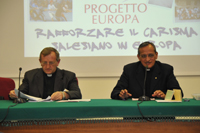

| RMG –European Provincials: Project for Europe, the present and future |
| RMG – III Meeting of European Provincials |
Starting with Evening Prayer, the III Meeting of the Salesian Provincials of Europe began with the introduction of some guests: Mother Yvonne Reungouat, Superior of the FMA, he Vicar, Sr. Emilia Musatti, Sr Maria del Carmen Canales, Councillor for Youth Ministry, Father Marco Tasca, Minister General of the Order of the Friars Minor Conventuals, Father Angelo Arrighini, of the Sacred Heart Fathers, chief editor of the magazine “Testimoni”.
Just coming from the Assembly of the Union of Superiors General (USG), the Rector Major Fr Pascual Chávez gave the first talk entitled “Salesian Life in present day Europe” showing how the current cultural and moral crises in Europe impinge on Consecrated Life (CL), and considering the challenges this situation present to CL and also the opportunities it provides.
“A crisis is a moment of purification, a call to personal and institutional conversion; it helps us to reflect and zero in on the things that really matter in our lives; seen this way, it is a time pregnant with hope,” the Rector Major said.
The lack of faith and the infiltration of ”practical atheism” also among Salesians, the lack of certainties in society, the fragmentation of life , the fear of “the new and the unknown” observable in European society are some of the characteristics of the cultural and moral crises in Europe. Faced with this situation CL is called to live its “prophetic” identity also in its minority status: “What matters is to be completely what we are called to be in the Church and in the world; what matters is how God sees us and not how the world receives us. We are to be an evangelical provocation, a brotherhood possible for people who are different, a credible witness, a hope for the poorest.” Conscious that it is not a question of status but of fidelity, “CL must adopt a true attitude of dialogue with culture and attune itself to the life of the people.”
“The greatest challenge that consecrated life must face is itself; it must begin again to have full trust that the Lord will open a secure way to overcome the difficulties, as he did at the Red Sea.” CL is called to make itself intelligible to the people, finding new ways of helping them see what it really is; reaffirming the values which distinguish it such as the definitive nature of a choice of a consecrated life; a witness to communion; a process of “de-clericalisation”, living in poverty, using the new technologies appropriately so that they enhance our service and do not become an obstacle to it. To this needs to be added the “generational” situation of CL in Europe: so many elderly and so few young ones; a renewed attention to the situation of youth: “We need to learn to dialogue with them, using their languages and educating ourselves to get on the wavelength of their aspirations and preoccupations.”
Fr Chávez indicated some practical paths and commitments to be pursued. Among the first are the young people who are searching for a purpose in life; community life; a presence with those who are left to one side; secularisation; ecumenism and inter-religious dialogue. The commitments indicated by the Rector Major to the Provincials of Europe are: the building of communities in which the gift of brotherhood is joyfully lived; the provision of serious programmes of spiritual growth; the recovery of the centrality of the mission; the appreciation and use of the experience of sharing with lay people; the support of new apostolic presences and the living at a deep level of the experience of interculturality.
“It is our responsibility before God and the young to do everything possible to ensure a future for consecrated life and Salesian life in Europe.” In this way the IX successor of Don Bosco indicated the governing strategies to be used in every day life. They presume the conversion of heart of every Salesian: “The Project for Europe is first of all a process from within!” listening to the needs of the young and the action of communities of consecrated persons.
Fr Adriano Bregolin, Vicar of the Rector Major then presented the views of the General Council about the three Regions of Europe and the progress made in the last few years.
Published 26/11/2010
